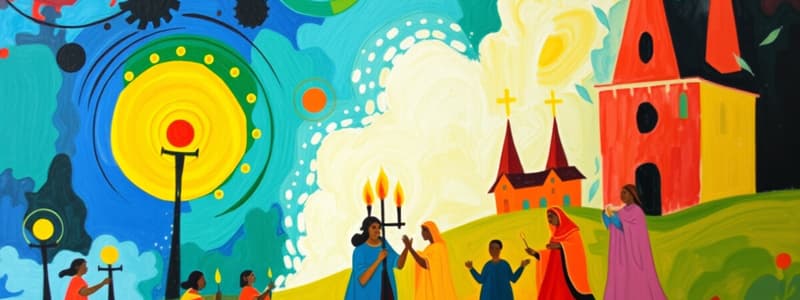Podcast
Questions and Answers
What activity was commonly performed during the 12 days of Christmas?
What activity was commonly performed during the 12 days of Christmas?
Which of the following statements is true about Shrove Tuesday?
Which of the following statements is true about Shrove Tuesday?
What traditional activity is associated with May Day celebrations?
What traditional activity is associated with May Day celebrations?
What was a common feature of Whitsun celebrations?
What was a common feature of Whitsun celebrations?
Signup and view all the answers
How was harvest home celebrated in August?
How was harvest home celebrated in August?
Signup and view all the answers
Study Notes
Holy Days and Celebrations
- The number of 'holy days' decreased significantly by the reign of Elizabeth I compared to the Middle Ages.
- Important calendar days still celebrated included feasting and community gatherings.
Christmas Celebrations
- The 12 days of Christmas involved eating, drinking, singing carols, and dancing.
- Mumming plays featured performers in masks and disguises.
- In southern England, wassailers sang around apple trees and fired guns to ward off evil spirits.
Shrove Tuesday
- Coincided with the Tuesday before Lent.
- Featured 'shrove-tide football' games for young men.
- Pancake races trace back to the 15th century.
Whitsun
- Popular for parish ales, a time for communal drinking and celebration.
- In northern England, 'rush-bearing' involved carting rushes to church and spreading them on the church floor.
May Day
- Marked by the erection of maypoles on village greens.
- Summer kings and queens were chosen to preside over May games, often characterized by drunken revelry.
Midsummer's Eve
- Celebrated with bonfires and drinking ale.
- Some villages held gatherings in church porches to see visions of impending deaths for the following year.
Harvest Home
- Celebrated in August, marking the end of the farming year.
- Festivities included feasting and drinking, particularly after a good harvest.
Studying That Suits You
Use AI to generate personalized quizzes and flashcards to suit your learning preferences.
Description
Explore the various holy days and celebrations that marked English culture from the Middle Ages to the reign of Elizabeth I. This quiz covers significant events like Christmas, Shrove Tuesday, Whitsun, and May Day, highlighting traditional customs and communal activities. Test your knowledge of festive traditions and their historical significance.



